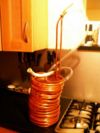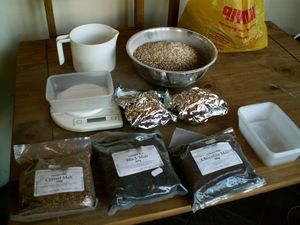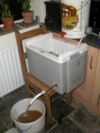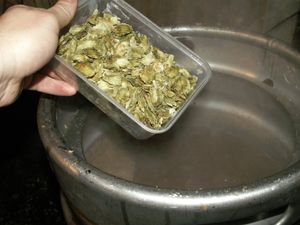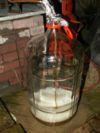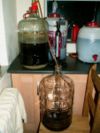m (→Preparations) |
m |
||
| (87 intermediate revisions by 3 users not shown) | |||
| Line 1: | Line 1: | ||
| − | There | + | [[Category:Beer]] |
| + | [[Category:Beer brewing process]] | ||
| + | ''For an alternative method of brewing, also see [[Brew in a Bag]]'' | ||
| + | |||
| + | This is a guide of how to brew using a simple set up and methods. | ||
| + | The methods followed are done for 3 main reasons. | ||
| + | *It makes very good beer. | ||
| + | *It allows for a short brew session | ||
| + | *It keeps the equipment simple and therefore relativity cheap. | ||
| + | There maybe quicker, cheaper, simpler ways to brew but this is the way I do it. | ||
| + | There are detailed articles on the reasons certain steps of a brew are done so this article will not explain why things are done but just how they are done. | ||
| + | I know this method works and my water is suitable for brewing and gives good results.<br>In the interest of the '''KISS''' method. ('''K'''eep '''I'''t '''S'''imple '''S'''tupid) I don't do the calculations for every brew unless I am doing a really high gravity brew. I don't test for starch conversion or treat my water. I also do not test for the gravity of my runnings because I know from experience that for a beer of around 5% to 6% my sparge runnings do not fall below 6%. For your first one or two brews you may wish to do some of these things.<br> | ||
| + | I use pre cracked malt and a aerating syphon tub on my kettle. | ||
==Equipment used== | ==Equipment used== | ||
| − | *HLT: A plastic pail with a domestic immersion heater | + | ''' |
| − | *MLT: A converted cooler with a copper manifold and ball valve | + | Main''' |
| − | *Kettle: A converted keg | + | *'''HLT:''' A plastic pail with a domestic immersion heater |
| − | *Heat source : A 30,000 BTU propane burner. | + | [[Image:Element.JPG|100px|HLT]] |
| + | *'''MLT:''' A converted cooler with a copper manifold and ball valve. | ||
| + | [[Image:Cooler.JPG|100px|MLT]] [[Image:Manifold.JPG|100px|Manifold]] | ||
| + | *'''Kettle:''' A converted keg with a syphon tube and pot scrubber strainer. Wort aerator drainer | ||
| + | [[Image:Spigotandfiller.JPG|100px|Kettle and tap]] | ||
| + | [[Image:Syphon_Tube_and_Strainer.JPG|100px|Inside Kettle]] | ||
| + | [[Image:Aerate.JPG|100px|Aerator]] | ||
| + | *'''Heat source:''' A 30,000 BTU propane burner. | ||
| + | [[Image:Burner.JPG|100px]] | ||
| + | *'''Immersion Wort Chiller''' | ||
| + | [[Image:Wortchiller.JPG|100px]] | ||
| + | |||
| + | '''Sundries''' | ||
| + | *Jug | ||
| + | *Extra 10L pail | ||
| + | *Large spoon | ||
| + | *Digital thermometer | ||
| + | *Hydrometer and test jar | ||
==Recipe== | ==Recipe== | ||
| − | + | '''Hobgoblin Clone''' | |
| + | [[Image:Weigh.JPG|thumb|weighing the ingredients]] | ||
| + | Hobgoblin is a powerful full-bodied copper red, well-balanced brew. Strong in roasted malt with a moderate hoppy bitterness and slight fruity character that lasts through to the end. A full chocolate malt flavour beer by the addition of a small proportion of chocolate malt. | ||
| − | :4.80 kg Maris Otter Pale (2 Row) | + | Batch Size 23L (6 gallon US)<br> |
| − | :0.25 kg Caramel/Crystal Malt - 60L | + | Pre Boil Volume 30L (8 gallon US)<br> |
| − | :0.20 kg Cara-Pils/Dextrine | + | Mash 68°C (154°F) For 60 Mins<br> |
| − | :0.15 kg Chocolate Malt | + | OG 1056<br> |
| − | :45.00 gm Styrian Goldings | + | ABV 5.6%<br> |
| − | :45.00 gm Fuggles | + | |
| + | :4.80 kg Maris Otter Pale (2 Row)(10.5lbs) | ||
| + | :0.25 kg Caramel/Crystal Malt - 60L (0.55lbs) | ||
| + | :0.20 kg Cara-Pils/Dextrine (0.44lbs) | ||
| + | :0.15 kg Chocolate Malt (0.33lbs) | ||
| + | :45.00 gm Styrian Goldings (1.6oz) | ||
| + | :45.00 gm Fuggles (1.6oz) | ||
| + | :Danstar Nottingham Dry Yeast (1 pack) | ||
| + | :1 teaspoon Irish moss. | ||
==Method== | ==Method== | ||
===Preparations=== | ===Preparations=== | ||
Pre Boil a kettle of water and leave to cool. (For yeast hydration) | Pre Boil a kettle of water and leave to cool. (For yeast hydration) | ||
| − | ==== | + | ====Water Volumes==== |
| − | + | :Grain Bill: 5.4KG (11.9lbs) | |
| − | + | :Mash Ratio: 2.6L/KG (1.25qt/lbs) | |
| − | + | :Mash Water: 14L (14.7qts) (First runnings 6L (6.3qts)) | |
| − | + | :Sparge Water: 24L (25.3qts) | |
| − | |||
====Set up the brewing equipment==== | ====Set up the brewing equipment==== | ||
| + | Set up you HLT, MLT and Kettle. This equipment needs to be clean but not sanitised | ||
====Heat the sparge water==== | ====Heat the sparge water==== | ||
| − | + | heat 14L of water to 77°C this take me around 30 minutes and gives time to prepare grain and hops. | |
====Weigh the ingredients==== | ====Weigh the ingredients==== | ||
| − | If you weigh and lay out all you ingredients then it's less likely that you will forget a step in the brewing process. | + | If you weigh and lay out all you ingredients then it's less likely that you will forget a step in the brewing process. When weighing the hops split into 3 lots of 15g (4oz) of both hops. 15+15 bittering, 15+15 flavour, 15+15 aroma. |
| − | |||
| − | |||
| − | |||
===Mashing=== | ===Mashing=== | ||
| + | [[Image:Adding_mash_water.JPG|thumb|100px|Add Mash Water]] | ||
| + | [[Image:Strike_temp.JPG|thumb|100px|Mash Temperature]] | ||
| + | Mashing at 68°C for 60 minutes will give the correct temperature and time for the enzymes in the malt to convert the starch to sugar. | ||
*Make sure the manifold is secured correctly | *Make sure the manifold is secured correctly | ||
| Line 47: | Line 86: | ||
*Check the temperature to make sure it is 68°C | *Check the temperature to make sure it is 68°C | ||
*Close the lid and leave for 60 minutes | *Close the lid and leave for 60 minutes | ||
| + | |||
| + | The time the mash takes can be used to mix a container of sanitiser and rehydrate the yeast | ||
| + | |||
| + | ===Rehydrate the yeast=== | ||
| + | Sanitise a glass, add the preboiled water, sprinkle on the yeast, cover with plastic wrap and leave in a warm place until required)<br> | ||
| + | [[Image:Hydrating_Yeast.JPG|100px]] | ||
| + | |||
| + | ===Heat your Sparge water=== | ||
| + | Heat 24L of water to 77°C | ||
| + | Start to heat your sparge water around 30 minutes before the end of the mash. | ||
| + | |||
| + | ===First runnings=== | ||
| + | [[Image:First_runnings.JPG|100px|thumb]] | ||
| + | Use a jug to drain off some wort from the mash, return the first few jugfuls back to the mash until the runnings start to come out clearer. Drain all the first runnings into a pail and add to the kettle. | ||
| + | In the interest of speeding up your brew day, you may wish to start heating the kettle at this point. If you do then be careful not to heat to vigorously or you'll caramelise the wort | ||
| + | |||
| + | ===Batch sparging=== | ||
| + | [[Image:Sparge.JPG|100px|right]] | ||
| + | Depending on the size of you mash tun you will need to add your sparge water in one, two or even three parts. Add the water and stir to mix. leave for 5 to ten minutes, mix again then drain, returning the first few jugfuls to the mash until running clearer. Add to the kettle and repeat. | ||
| + | |||
| + | For your first one or two brews to may want to check that the runnings do not drop to a gravity of less the 1006. This can cause the extraction of [[tannins]] from the grain and cause and harsh/astringent off flavour. If the gravity does drop 2 low then stop sparging. You can top the kettle up to the required volume with water or just live with th3 smaller volume.<br> | ||
| + | |||
| + | ===Boiling=== | ||
| + | [[Image:Hop_additions.JPG|thumb]] | ||
| + | When all of the wort is added to the kettle turn up the heat. | ||
| + | |||
| + | Bring to a rolling boil, Start the timer. (B+0 mins) | ||
| + | |||
| + | *B+00mins : Add Bittering Hops | ||
| + | *B+30mins : Add Flavouring Hops | ||
| + | *B+50mins : Add Wort chiller to sanitise | ||
| + | *B+55mins : Add Irish moss | ||
| + | *B+60mins : Add aroma hops, turn off flame, turn on wort chiller | ||
| + | |||
| + | Hook up the immersion chiller and cool the wort to below 27°C (Save the water from the chiller to for cleaning) | ||
| + | |||
| + | ===Finishing=== | ||
| + | |||
| + | *Drain the wort into the fermenter. | ||
| + | [[Image:Drain_kettle.JPG|100px]] | ||
| + | *Add hydrated yeast | ||
| + | [[Image:Happy_Yeast.JPG|100px]] | ||
| + | *Add cap and airlock or blow off tube. | ||
| + | *Ferment for 5 - 7 days. | ||
| + | *Check gravity make sure it's below 1015 | ||
| + | *Rack to secondary and leave for 10 - 14 days. | ||
| + | [[Image:Racking_to_secondary.JPG|100px]] | ||
| + | *Check gravity make sure it's finished fermenting. | ||
| + | *Bottle or keg. | ||
| + | *Leave to carbonate and condition for 2-4 weeks. | ||
| + | |||
| + | |||
| + | ENJOY | ||
Latest revision as of 04:21, 8 December 2008
For an alternative method of brewing, also see Brew in a Bag
This is a guide of how to brew using a simple set up and methods. The methods followed are done for 3 main reasons.
- It makes very good beer.
- It allows for a short brew session
- It keeps the equipment simple and therefore relativity cheap.
There maybe quicker, cheaper, simpler ways to brew but this is the way I do it.
There are detailed articles on the reasons certain steps of a brew are done so this article will not explain why things are done but just how they are done.
I know this method works and my water is suitable for brewing and gives good results.
In the interest of the KISS method. (Keep It Simple Stupid) I don't do the calculations for every brew unless I am doing a really high gravity brew. I don't test for starch conversion or treat my water. I also do not test for the gravity of my runnings because I know from experience that for a beer of around 5% to 6% my sparge runnings do not fall below 6%. For your first one or two brews you may wish to do some of these things.
I use pre cracked malt and a aerating syphon tub on my kettle.
Contents
Equipment used
Main
- HLT: A plastic pail with a domestic immersion heater
- MLT: A converted cooler with a copper manifold and ball valve.
- Kettle: A converted keg with a syphon tube and pot scrubber strainer. Wort aerator drainer
- Heat source: A 30,000 BTU propane burner.
- Immersion Wort Chiller
Sundries
- Jug
- Extra 10L pail
- Large spoon
- Digital thermometer
- Hydrometer and test jar
Recipe
Hobgoblin Clone
Hobgoblin is a powerful full-bodied copper red, well-balanced brew. Strong in roasted malt with a moderate hoppy bitterness and slight fruity character that lasts through to the end. A full chocolate malt flavour beer by the addition of a small proportion of chocolate malt.
Batch Size 23L (6 gallon US)
Pre Boil Volume 30L (8 gallon US)
Mash 68°C (154°F) For 60 Mins
OG 1056
ABV 5.6%
- 4.80 kg Maris Otter Pale (2 Row)(10.5lbs)
- 0.25 kg Caramel/Crystal Malt - 60L (0.55lbs)
- 0.20 kg Cara-Pils/Dextrine (0.44lbs)
- 0.15 kg Chocolate Malt (0.33lbs)
- 45.00 gm Styrian Goldings (1.6oz)
- 45.00 gm Fuggles (1.6oz)
- Danstar Nottingham Dry Yeast (1 pack)
- 1 teaspoon Irish moss.
Method
Preparations
Pre Boil a kettle of water and leave to cool. (For yeast hydration)
Water Volumes
- Grain Bill: 5.4KG (11.9lbs)
- Mash Ratio: 2.6L/KG (1.25qt/lbs)
- Mash Water: 14L (14.7qts) (First runnings 6L (6.3qts))
- Sparge Water: 24L (25.3qts)
Set up the brewing equipment
Set up you HLT, MLT and Kettle. This equipment needs to be clean but not sanitised
Heat the sparge water
heat 14L of water to 77°C this take me around 30 minutes and gives time to prepare grain and hops.
Weigh the ingredients
If you weigh and lay out all you ingredients then it's less likely that you will forget a step in the brewing process. When weighing the hops split into 3 lots of 15g (4oz) of both hops. 15+15 bittering, 15+15 flavour, 15+15 aroma.
Mashing
Mashing at 68°C for 60 minutes will give the correct temperature and time for the enzymes in the malt to convert the starch to sugar.
- Make sure the manifold is secured correctly
- Make sure the tap is closed
- Make sure the mash water is at the correct temp
- Add the grain to the mash tun
- Add the water to the mash tun and stir to make sure all the grain is wetted, don't forget the corners
- Check the temperature to make sure it is 68°C
- Close the lid and leave for 60 minutes
The time the mash takes can be used to mix a container of sanitiser and rehydrate the yeast
Rehydrate the yeast
Sanitise a glass, add the preboiled water, sprinkle on the yeast, cover with plastic wrap and leave in a warm place until required)

Heat your Sparge water
Heat 24L of water to 77°C Start to heat your sparge water around 30 minutes before the end of the mash.
First runnings
Use a jug to drain off some wort from the mash, return the first few jugfuls back to the mash until the runnings start to come out clearer. Drain all the first runnings into a pail and add to the kettle. In the interest of speeding up your brew day, you may wish to start heating the kettle at this point. If you do then be careful not to heat to vigorously or you'll caramelise the wort
Batch sparging
Depending on the size of you mash tun you will need to add your sparge water in one, two or even three parts. Add the water and stir to mix. leave for 5 to ten minutes, mix again then drain, returning the first few jugfuls to the mash until running clearer. Add to the kettle and repeat.
For your first one or two brews to may want to check that the runnings do not drop to a gravity of less the 1006. This can cause the extraction of tannins from the grain and cause and harsh/astringent off flavour. If the gravity does drop 2 low then stop sparging. You can top the kettle up to the required volume with water or just live with th3 smaller volume.
Boiling
When all of the wort is added to the kettle turn up the heat.
Bring to a rolling boil, Start the timer. (B+0 mins)
- B+00mins : Add Bittering Hops
- B+30mins : Add Flavouring Hops
- B+50mins : Add Wort chiller to sanitise
- B+55mins : Add Irish moss
- B+60mins : Add aroma hops, turn off flame, turn on wort chiller
Hook up the immersion chiller and cool the wort to below 27°C (Save the water from the chiller to for cleaning)
Finishing
- Drain the wort into the fermenter.
- Add hydrated yeast
- Add cap and airlock or blow off tube.
- Ferment for 5 - 7 days.
- Check gravity make sure it's below 1015
- Rack to secondary and leave for 10 - 14 days.
- Check gravity make sure it's finished fermenting.
- Bottle or keg.
- Leave to carbonate and condition for 2-4 weeks.
ENJOY








